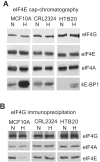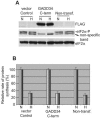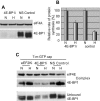Hypoxia inhibits protein synthesis through a 4E-BP1 and elongation factor 2 kinase pathway controlled by mTOR and uncoupled in breast cancer cells
- PMID: 16648488
- PMCID: PMC1489005
- DOI: 10.1128/MCB.26.10.3955-3965.2006
Hypoxia inhibits protein synthesis through a 4E-BP1 and elongation factor 2 kinase pathway controlled by mTOR and uncoupled in breast cancer cells
Abstract
Hypoxia is a state of low oxygen availability that limits tumor growth. The mechanism of protein synthesis inhibition by hypoxia and its circumvention by transformation are not well understood. Hypoxic breast epithelial cells are shown to downregulate protein synthesis by inhibition of the kinase mTOR, which suppresses mRNA translation through a novel mechanism mitigated in transformed cells: disruption of proteasome-targeted degradation of eukaryotic elongation factor 2 (eEF2) kinase and activation of the regulatory protein 4E-BP1. In transformed breast epithelial cells under hypoxia, the mTOR and S6 kinases are constitutively activated and the mTOR negative regulator tuberous sclerosis complex 2 (TSC2) protein fails to function. Gene silencing of 4E-BP1 and eEF2 kinase or TSC2 confers resistance to hypoxia inhibition of protein synthesis in immortalized breast epithelial cells. Breast cancer cells therefore acquire resistance to hypoxia by uncoupling oxygen-responsive signaling pathways from mTOR function, eliminating inhibition of protein synthesis mediated by 4E-BP1 and eEF2.
Figures







References
-
- Arora, S., J. M. Yang, and W. N. Hait. 2005. Identification of the ubiquitin-proteasome pathway in the regulation of the stability of eukaryoke elongation factor-2 kinase. Cancer Res. 65:3806-3810. - PubMed
-
- Arsham, A. M., J. J. Howell, and M. C. Simon. 2003. A novel hypoxia-inducible factor-independent hypoxic response regulating mammalian target of rapamycin and its targets. J. Biol. Chem. 278:29655-29660. - PubMed
-
- Bolster, D. R., S. J. Crozier, S. R. Kimball, and L. S. Jefferson. 2002. AMP-activated protein kinase suppresses protein synthesis in rat skeletal muscle through down-regulated mammalian target of rapamycin (mTOR) signaling. J. Biol. Chem. 277:23977-23980. - PubMed
Publication types
MeSH terms
Substances
LinkOut - more resources
Full Text Sources
Other Literature Sources
Medical
Miscellaneous
